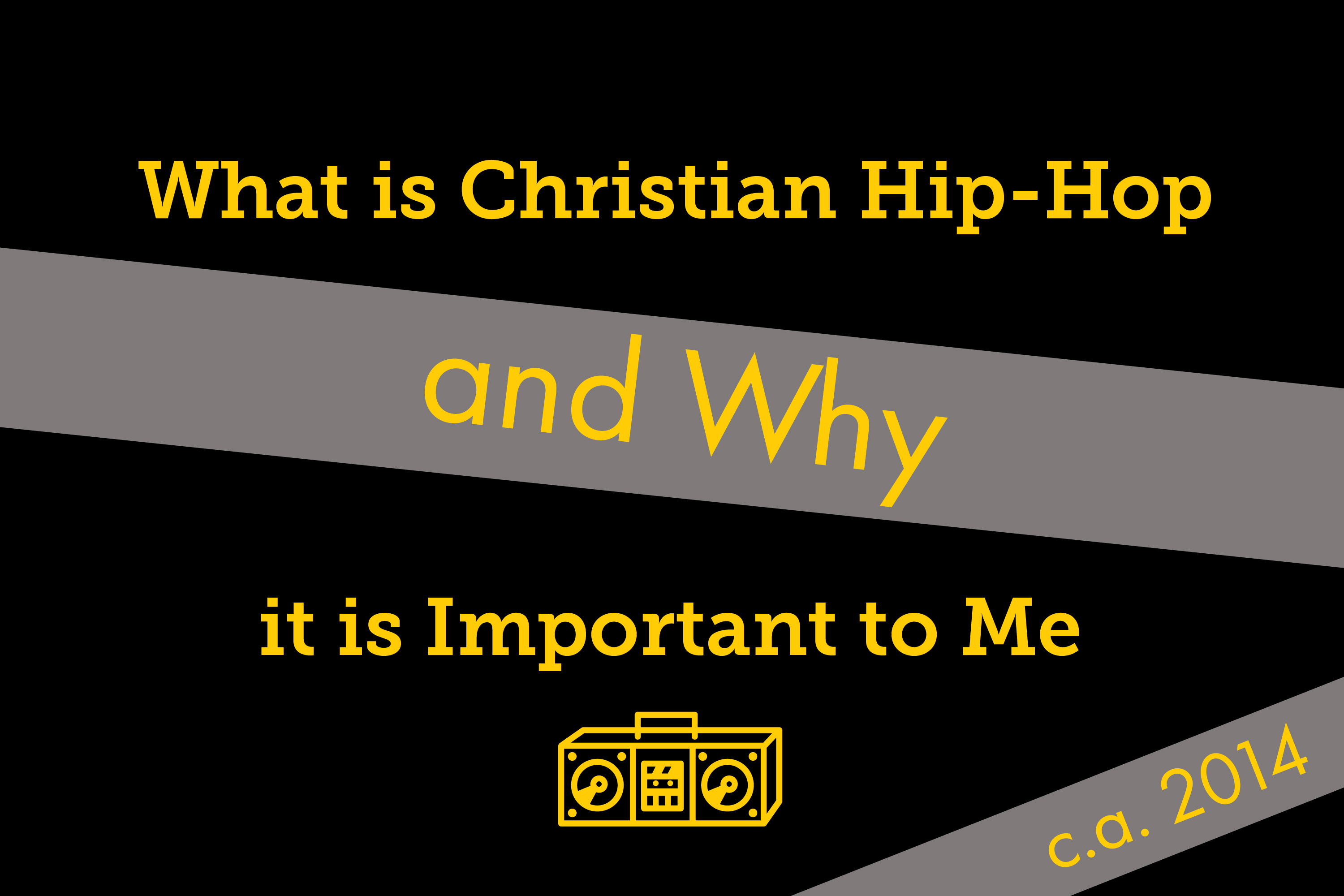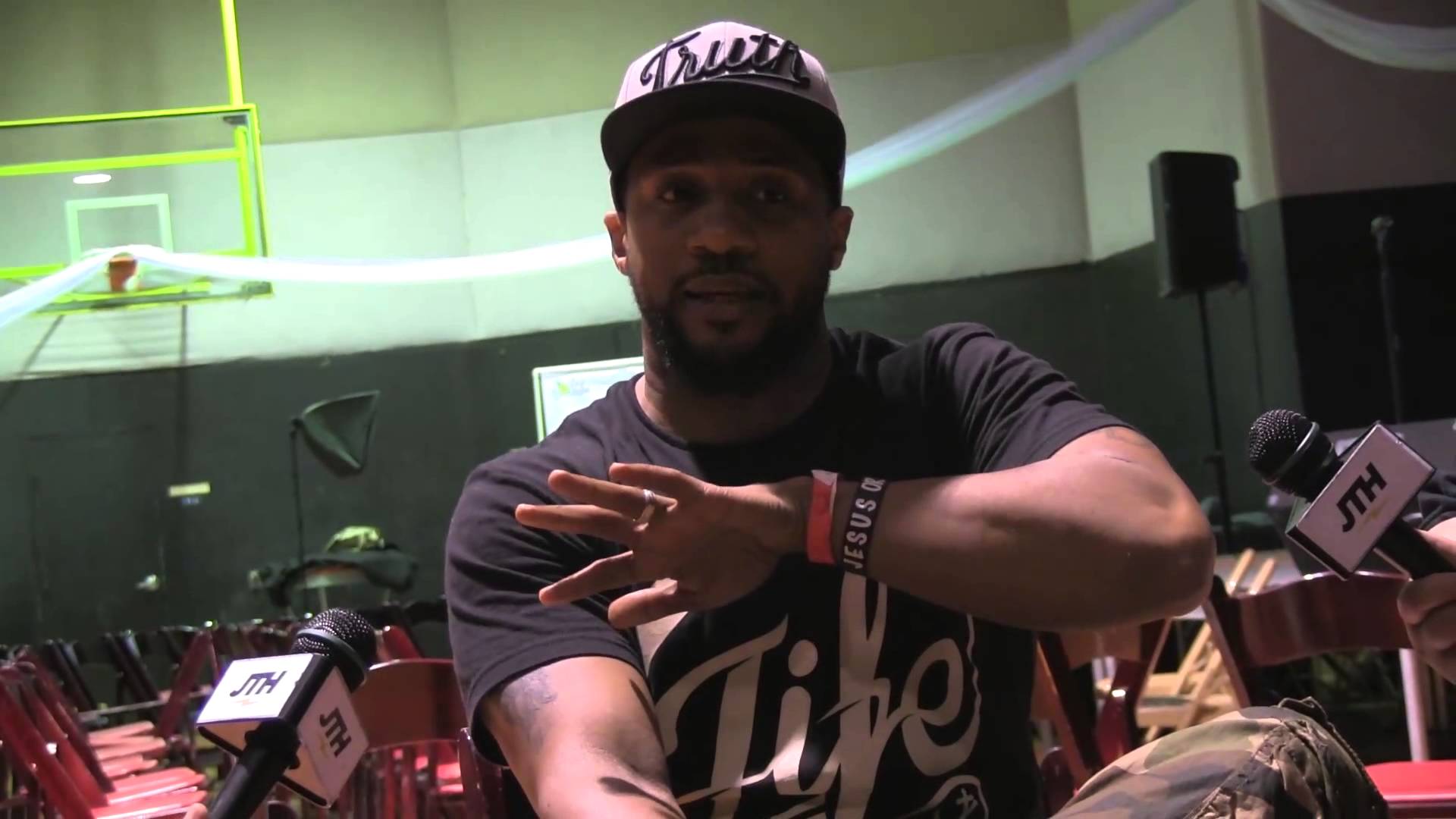In my college freshman English writing class, way back in September 2014, I wrote a paper about Christian hip-hop. I called it What is Christian Hip-Hop and Why is it Important to Me. I thought it would be interesting to share it and look back on the genre I’ve now been listening to for five years, and see how I perceived it three years ago. It follows.
…
I used to listen to music that said, “have tons of sex, go get drunk, get high, get money, and fight your haters.” I listened to music that promoted a lifestyle that I didn’t live and wanted to avoid. In Spring 2012, while scrolling through the Hip-Hop subgenres of the Google Play Store on my phone, I saw “Christian Rap.” I decided to try it out and now Christian Hip-Hop is my favorite genre of music and it is of great importance to me. The music is simply Hip-Hop that glorifies and honors Jesus. It has made a humongous impact on my life by drawing me and keeping me close to Christ.
To give some background, it emerged in the mid-80s, with a man named Stephen Wiley generally being attributed as having made the first Christian Hip-Hop songs. In the 90s and 00s it grew and the genre is now very popular, with albums often getting in the top 10 of various charts and even topping the overall Billboard charts. It is misunderstood because of how it addresses the lies told in mainstream Hip-Hop, issues of the urban context that many are unfamiliar with, and aspects of Christian faith.
A majority of Christian Hip-Hop artists (and Hip-Hop artists in general) are urban African-Americans and often talk about specific issues occurring in and pertaining to their communities. There are many songs that discuss violence and gangs, drug and alcohol addictions, fatherlessness, and other issues plaguing many urban communities. An artist called Thi’sl had a song called “I Hate You (Crack)” on his album Chronicles of an X-Hustler. In this song he said “You took away so much and I can never get it back. That’s why I made a vow that I would never take you back” (Thi’sl). This song talked about his hatred for cocaine and how he has seen it ruin and take over the lives of many people around him. He is talking about how he has seen people hurt and even kill each other over cocaine as well as the negative health effects that occur to people addicted to cocaine. “I hate the fact I helped you make a slave of my mommy, but that’s because you told me that I only needed money” (Thi’sl). In many inner city communities, most people are poor, but selling drugs like cocaine is an easy way to escape the poverty and get rich quick. He is addressing cocaine as a person, discussing his hatred for it because he used to supply the drug to his mother. Thi’sl references cocaine as making a slave of his mother because she became addicted to it due to him.
As the song title makes evident, this is a very emotional song where the artist talks with anger about his hateful feelings towards cocaine. He also says “They took precious from the womb. I never seen my little cousin” (Thi’sl) in reference to a specific effect of the many bad health effects of cocaine use. In pregnant women, the use of cocaine puts them at a high risk of having a miscarriage (Dangers of cocaine use during early pregnancy 1). Thi’sl is saying that his aunt’s cocaine use caused her to miscarry his cousin. A song like this is misunderstood within Hip-Hop as a whole because it shows the opposite of what Hip-Hop claims to be the good life for those in the poor, urban context. It displays many of the terrible affects of using and selling cocaine, which is something that many Hip-Hop artists promote and glorify.
Often times artists address the lies often told in mainstream Hip-Hop that promote and glorify violence, drugs and alcohol, sex outside of marriage, and the degradation and objectification of women. Christian Hip-Hop artists are misunderstood among Hip-Hop as a whole because they don’t condone and also speak against the lifestyles that much of mainstream Hip-Hop promotes. In his song “Fakin’ (feat. Thi’sl)”, Lecrae addresses how many rappers pretend that they are wealthy gangsters. The chorus goes “I heard him say he bought the block (Fakin!) In his song he say he gansta’ but he not (Fakin!) Say he makin’ money, cashin’ big checks (Fakin!) While his chain leavin’ green on his neck (Fakin!) I’m not impressed.” (Lecrae) He references how lots of rappers pretend to be wealthy by saying that their chains leave green on their neck. Often times fake gold leaves a green mark on skin and in this song’s music video, the rapper who pretends to be rich appears to take his gold chain from a container that might appear in an arcade machine.
In his first verse, Lecrae says, “They say they ridin’ Bugatti’s, man, put some babies through college. Quit tryna’ act like the trap is cool, ‘cause we tired hearin’ that garbage.” In Hip-Hop, leading a successful life of wealth and power in “the trap” is often promoted and glorified. Some rappers claim to live in “the hood” and ride extravagant, extremely expensive cars like Bugatti’s, but Lecrae is saying that they could make better use of the money that they claim to have. He says that it would be better to give young adults higher education than for them to live in “the hood” and “trap” for a living. To “trap” means to sell drugs, be involved in gangs, etc. Lecrae grew up in a poor inner city community, so he knows what “the trap” is like. He knows that it is not a good situation to be in and wants rappers to stop pretending that it is. Thi’sl says “He bought that Bentley kit, and wrapped it ‘round a 300. No matter how you put it, boy, that’s still a 300” (Lecrae). When he says “300,” he is referring to a Chrysler 300 model luxury car, which has a body shape similar to that of a Bentley. He is talking about how this rapper purchased a kit that would make his Chrysler 300 appear to be a Bentley. A Bentley would cost five to ten times that of a Chrysler 300, but this rapper cannot afford that so he has a Bentley kit on his Chrysler to make him appear to be wealthy. This song directly confronts the ethics found in mainstream Hip-Hop about greed and wealth, using logic to describe how many rappers are faking to be rich.
Christian Hip-Hop artists are also often misunderstood when talking about aspects of their faith. They proclaim and glorify Jesus as Lord and King in a culture that teaches us to look anywhere else to find meaning and satisfaction. They talk about what the Christian life is like and should be like, a topic that is misunderstood by most in 2014, even among those who claim to be Christians. An artist called Trip Lee made a song called “For My Good (feat. Jai)” about how God works all things together for the good of those who love Him and are called according to His purpose. He says “I’ve had my ups and downs, my rises and my falls, So sometimes people ask me, how I survive it all, I tell ’em ’bout my Lord, let’s get it understood, my King controls it all and He does it for my good” (Trip Lee). This song really encouraged me in Spring 2013 when I was very lonely and struggling with depression. I felt as if nothing was going well in my life and I listened to this song almost everyday. He starts out the song by saying “You ever felt like stuff just never goes your way, like everything’s against you? Well God never promised that he would keep me away from all those trials. If I want perfection I’ma have to wait ‘til later, but I ain’t trippin’, cause He has promised, that He will work all things together for the good of those who love Him and are called according to his purpose” (Trip Lee). Nobody would talk to me or want to spend time with me, but constantly being reminded by this song that God works all things together for my good, regardless of how bad I feel, was very uplifting. The logic of his reference to Romans 8:28 which this song’s message is based upon, along with the positive emotion of the song’s sound helped me to get through some very bad days and weeks when the only people who talked to me were my parents. Christian Hip-Hop songs like this taught and helped me to seek comfort and faith in God rather than alternatives that have never fulfilled me.
I wanted to write about the genre of Christian Hip-Hop because it is a genre of music that I really enjoy listening to as well as the only genre that I am really into. I am drawn to this genre because of its sound, the artists’ transparency and honesty, and of course the message of the hope that is found in Christ. This genre of music is very important to me because it has been an incredible help to me in my faith. I couldn’t say that all Christian Hip-Hop artists speak about the same things in their songs, sound the same, or speak from the same perspective, but what I can say that they have in common is the desire to glorify and honor Jesus in their music. If I had never heard it, I would be a very different guy.
Bibliography
Lecrae. “Fakin’ (feat. Thi’sl).” Gravity. Reach Records. 2012.
Thi’sl. “I Hate You (Crack).” Chronicles of an X-Hustler. X Hustler Music. 2009
Trip Lee. “For My Good (feat. Jai).” The Good Life. Reach Records. 2012.
“Dangers of cocaine use during pregnancy.” The Labor Of Love. The Labor of Love, n.d. Web.
…
What do you think? Let me know in the comments and on social media.





